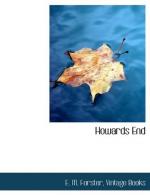|
This section contains 8,966 words (approx. 30 pages at 300 words per page) |

|
SOURCE: Levenson, Michael. “Liberalism and Symbolism in Howards End.” Papers on Language and Literature 21, no. 3 (summer 1985): 295-316.
In the following essay, Levenson argues that Howards End “gives the experience of modernity a turn toward politics and toward mysticism.”
Liberalism and symbolism, both unwieldy terms, become more unwieldy when brought together. They seem to belong to such different orders of description and such different strains of modernity that it provokes a small mental shudder to recall that John Stuart Mill and Charles Baudelaire were near contemporaries. Although no one would mistake E. M. Forster for either Mill or Baudelaire, liberalism and symbolism are prominent in his ancestry, and Howards End (1910), which occupies a place in both lineages, marks a striking point of connection between political hopes and literary tropes. The only thing more vivid than Forster's perception of social constraint was his perception of imaginative escape. Looking at the...
|
This section contains 8,966 words (approx. 30 pages at 300 words per page) |

|


